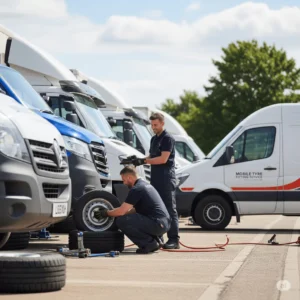Ever turned your key and heard a click instead of a roar?
It could be your alternator instead of your battery.
There’s a good chance that your alternator gave out while you were stuck on the side of the road with your warning lights on and your bonnet up. A dead battery is usually what drivers think is wrong, but the real problem is usually deeper, in the part of the car that charges the battery in the first place.
The alternator in your car is the hidden hero of its electrical system. The battery charger keeps the battery charged while you drive. It powers everything from your headlights and windscreen wipers to your heated seats and phone charger. There is more at stake when it fails than just a small inconvenience. You could have a crash on the side of the road, your electricity could go out, or you could need emergency services.
A broken alternator is a common reason why cars break down and need emergency mobile services like fast mobile tyre fitting, roadside tyre change, or even 24-hour mobile tyre fitting in the UK. Not only are these services called out for flat tires, but also for electrical problems that leave drivers stuck and angry.
What Exactly Does a Car Alternator Do?
The Heart of Your Vehicle’s Electrical System
Most people think that their car’s battery is the only source of power, but the alternator is actually what makes your car’s electronic life possible.
So, what does it actually do?
Converts mechanical energy into electrical energy
When your engine runs, the alternator uses that movement to generate electricity.
Keeps the lights on and the comforts running
Your alternator powers everything in your car, from the headlights and dashboard to the DVD player and heated seats.
Charges your battery as you drive
While the battery starts your car, the alternator keeps it charged. Without it, your battery would die in a matter of miles.
Why It Matters on UK Roads
Stop-start traffic in cities like London or Bristol
Your alternator has to work extra hard to keep up with the demands of constantly stopping and starting in city traffic, especially if your lights, heaters, and screens are always on.
Cold, wet UK weather
It's not good for alternators to be wet or cold. The electrical parts of your car work harder when it rains or when it's cold in the morning. If the generator is weak, you'll notice it quickly.
Linked to unexpected breakdowns
A failing alternator is a common reason drivers end up needing Emergency Mobile Tyre Fitting or other roadside assistance. One moment you’re driving fine — the next, the electrics cut out, and you're stuck.
Signs Your Alternator May Be Failing
Top Warning Signs to Watch For
Most alternators don’t stop working all of a sudden; instead, they tend to stop working slowly, giving you hints before they break down completely. Headlights that are dim or flashing are one of the first signs. It’s possible that your alternator isn’t making enough power to keep your lights on if they seem dull or flicker while you’re driving.
Seeing a battery warning light on your dashboard is another common sign. A lot of drivers think this symbol means the battery is bad, but it usually means the alternator is having trouble, especially if the battery is pretty new.
Making strange noises from under the hood is another sign that something is wrong. If you hear grinding or whining, it could be an alternator bearing that is worn out or a drive belt that is slipping. Both of these problems make it less likely to work right.
Bugs in the electricity around your car may also be seen. If your electric windows move more slowly than usual, your radio stops working right, or your dashboard lights flicker for no reason, it’s likely that your alternator isn’t providing stable voltage.
The most worrying thing might be when your engine stops running or won’t start at all. If your generator breaks down, it can drain your battery faster than it charges it. This means that your car won’t have the power it needs to run or even start.
It’s easy to brush these off as small annoyances, but they’re actually signs that your car needs help. They can turn into full-on breaks that leave you stuck at the worst possible time if you don’t fix them.
Real-World Example
A driver in Bristol called for a Same Day Mobile Tyre Fitting because they thought they had a flat tyre. The driver thought it looked like an easy tyre problem because the car had broken down on the side of the road. But when our team got there, we found that the tires were fine. The real problem was a battery that was totally dead because the alternator was broken. There was no power, no start, and no notice until it was too late. It’s a classic example of how alternator failure can be confused for other issues, and why it’s important to know the signs.
Common Causes of Alternator Failure
Everyday Wear and Tear
Like most parts of a car, alternators aren’t made to last forever. Normal use wears down things over time. Most alternators last between seven and ten years, but it depends on how often the car is used, how the roads are, and how the driver drives. The internal parts of the alternator, especially the bearings and brushes, can start to wear out as your car hits more miles. When that happens, the alternator can’t turn mechanical energy into electrical power as well, and it will finally break.
In cities like Manchester and Birmingham, where people drive from start to stop a lot, even normal city driving can speed up wear. Because of the constant need for electricity, from your lights to your phone charger, your generator is almost always in use. The more you use it, the faster it breaks.
Environmental Factors in the UK
Internal wear is a big reason why alternators break, but the weather in the UK also plays a part. Water can get into the alternator casing during heavy rain, roads with standing water, and even small floods. It can ruin the internal circuitry, short out parts, or make the drive belt slip if water gets inside.
Winter adds to the problems. When it’s cold in the UK, salt and grit are used on the roads. This can lead to corrosion, especially if it builds up around the alternator or its electrical links. Corrosion makes the system less effective and can eventually cause voltage fluctuations or a full loss of power.
Even if you drive safely, your surroundings could still be slowly hurting your alternator. This is especially true in places where it rains a lot or where there is a lot of standing water.Lorem ipsum dolor sit amet, consectetur adipiscing elit. Ut elit tellus, luctus nec ullamcorper mattis, pulvinar dapibus leo.Lorem ipsum dolor sit amet, consectetur adipiscing elit. Ut elit tellus, luctus nec ullamcorper mattis, pulvinar dapibus leo.Lorem ipsum dolor sit amet, consectetur adipiscing elit. Ut elit tellus, luctus nec ullamcorper mattis, pulvinar dapibus leo.Lorem ipsum dolor sit amet, consectetur adipiscing elit. Ut elit tellus, luctus nec ullamcorper mattis, pulvinar dapibus leo.
How to Test Your Alternator at Home
DIY Testing Tips
You don’t always have to go to the shop right away if you think something is wrong with your car’s electrical system. You can test your alternator at home in a few easy steps, even if you don’t have many tools or much experience. A simple multimeter, which you can get for a low price at most auto shops, is one of the easiest ways to do it.
Before you start the engine, check the charge of the battery. It should read about 12.6 volts if the battery is good. After that, start the car and get another reading. The voltage should start to rise to between 13.8 and 14.8 volts if the generator is working right. If it is less than that, it could mean that your charger isn’t charging your battery enough.
Pay close attention to any grinding, whining, or squeaking sounds coming from under the hood while the engine is running. It’s possible that these sounds are caused by worn bearings, a loose drive belt, or other issues inside the generator that are making it work less well. Also, keep an eye on your dashboard. Warning lights like the battery icon or a “ALT” icon may show up and off, which is another sign that your alternator is having trouble.
These do-it-yourself checks won’t replace a professional diagnosis, but they can help you find problems early, before you need a full roadside repair.
When to Call in a Pro
If the problems don’t go away or if you keep seeing your battery drain, headlights that don’t work, or trouble starting your car, it’s time to stop guessing and call a skilled mechanic. Alternators that are broken can do strange things. Your driving is fine one minute and then you’re stuck on the hard shoulder for no reason the next.
This is when emergency services that are linked become very important. When drivers in the UK call for 24 hour mobile tyre fitting or roadside help, they often find that their breakdown was actually caused by a broken alternator. Not only does getting help early save you time and stress, it can also keep your battery and other important electrical parts from getting worse.
Don’t wait until it’s too late if your tests show signs of trouble. To get ahead of the problem, schedule a check or a mobile service.
Repair or Replace? Understanding Your Options
When Can It Be Repaired?
Not all problems with alternators need to be fixed by replacing the whole thing. A quick fix is sometimes all that’s needed to get your car back on the road. A mechanic can usually fix the problem quickly and cheaply if it’s something like a loose drive belt or a small electrical problem like a wire that’s rusted or a bad connection.
During the winter, when parts like belts are more likely to slip or shrink, many UK drivers have these smaller problems. A simple fix can save you a lot of money and trouble in the long run if you catch it early, like during a mobile check-up or regular service.
When Replacement Is the Only Option
If, on the other hand, your alternator has completely broken down, replacement is generally your only choice. If your generator dies, your whole electrical system will also die. This means that your battery will not be charged. The jump-start might work a few times, but not for long.
The cost-benefit comparison is important in this case. Most of the time, the cost of services and parts to rebuild or fix an alternator that isn’t working right ends up being the same as installing a new one. That’s why most mechanics in the UK will suggest a repair when the parts inside are too worn out or broken.
You can choose between OEM (original equipment maker) and aftermarket alternators when it’s time to get a new one. Even though OEM parts are more expensive, they are made to fit your car’s make and model perfectly, which is important for long-term efficiency and peace of mind. In the UK, aftermarket parts are often cheaper and easier to find, especially through mobile fitting services and local workshops. However, the quality can vary.
When you live in a city like London, Birmingham, or Glasgow, where same-day mobile services and roadside recovery are frequent, having a reliable replacement is very helpful. If you choose a high-quality alternator, whether it’s an OEM or expensive aftermarket one, you won’t have to call for emergency mobile tyre fitting or electrical help for a while.
What Happens if You Ignore a Bad Alternator?
Safety Risks
Cost of Delaying Repairs
Putting off engine repairs can also quickly cost you a lot of money. What starts as a worn-out alternator can lead to multiple problems with the whole system. For example, if you keep draining your battery, it might get permanently damaged, which will cost you more money than you planned. Low voltage starts could hurt even your starting motor over time.
This is where things can really go wrong. Take a picture of yourself going through Bristol or Birmingham when all of a sudden your dashboard lights flicker and your car dies at a roundabout. You think it’s just a flat tyre when you call for a Roadside Tyre Change or emergency mobile tyre fitting, but it turns out that the alternator broke. It now costs you more than one service because you didn’t pay attention to an early danger sign.
Maintenance Tips to Extend Alternator Life
Actionable Advice
Maintaining the health of your generator isn’t hard, but it does need some care. Having your battery and generator checked at least once a year, preferably before winter, is one of the best ways to keep your car from breaking down. A lot of shops and mobile tyre fitting services in the UK do this check as part of regular maintenance or packages to get your car ready for winter.
Another easy tip that people often forget is to keep the electrical links on the alternator clean and free of rust or corrosion. The wet weather and salty roads in the UK are known to cause corrosion under the hood. Preventative cleaning, or having your repair do it while the car is in for service, can help keep the power on.
Finally, be careful not to put too much stress on your car’s electronic system. Your alternator can get overworked if you use a lot of high-power aftermarket stereos, dash cams, and heated seats at the same time. Your alternator is being pushed too hard if you notice that the lights are getting dim when everything is on. Using electrical devices in a smart way can help them last longer.
Fixing problems before they happen costs a lot more than preventative care. You can avoid the stress of a sudden breakdown and keep your car going smoothly on UK roads with a little work and awareness. This is true whether you’re driving through the rainy hills of Wales or through the traffic in central London.
Conclusion: Stay Charged and Safe
If you don’t pay much attention to your car’s alternator, keep it that way. But as we’ve seen, it’s absolutely necessary to keep your car running smoothly on UK roads. The alternator is the quiet engine of your car’s electrical system. It charges the battery and powers your headlights and dashboard.
You should now have a good idea of what your alternator does, how to tell if it’s breaking down, and why it’s important to act quickly when problems happen. If you notice a flashing light or an odd noise coming from under the hood, it could be a sign of something bigger and more expensive that needs to be fixed.
Expert tip: Always keep an eye on electrical signs and make sure your car gets regular service. A little maintenance can save you a lot of trouble, especially if you need services like emergency mobile tyre fitting or 24-hour mobile tyre repair to keep your car moving.
You shouldn’t wait until you’re stuck on the hard road. If your alternator is in good shape, your trip will be safer and easier, no matter where in the UK you are.




